LOVE/HATE IN WAR- 2 SEPARATE STORIES ABOUT ‘TWO LITTLE BOYS’
LOVE/HATE IN WAR- 2 SEPARATE STORIES ABOUT ‘TWO LITTLE BOYS’
- INTRODUCTION BY BRIAN HARRISSON.i
The Newspaper column titled ‘Two Little Boys’ appeared in the Nightlyii on ’11 October 2024’. It was written by Ben Harvey, a Journalist. The column is about the current hostilities in the Middle East, between Israel on the one hand, and Hamas and Hezbollah, on the other. The conflict has the potential to spread to other states in the middle east. The hostilities followed an attack by Hamas attack on Israel on 7 October 2023. Israel responded powerfully by attacking Gaza initially and by extending it to other perceived Hamas and Hezbollah strongholds. The column is insightful, balanced and is worthy of being widely read in Australia and throughout the world.
I was initially surprised that Mr Harvey’s column had precisely the same name as that of a popular song written in 1903. iii The song was popular, in the United Kingdom and elsewhere during the era of Margaret Thatcher’s Prime-Ministership. Rolf Harris sang the song, on public radio. I was struck by the apparent connection between the two fine pieces of literature.v I say something further about this, in the foregoing End Note and in Section 4, the ‘Brief closing commentary’.
I begin with Mr Harvey’s column in section 2, immediately below. This is followed by the lyrics of the song in section 3.
- NEWSPAPER COLUMN ‘TWO LITTLE BOYS’ BY BEN HARVEY.
These two photos of boys show why the same old conflicts keep playing out in the Middle East’
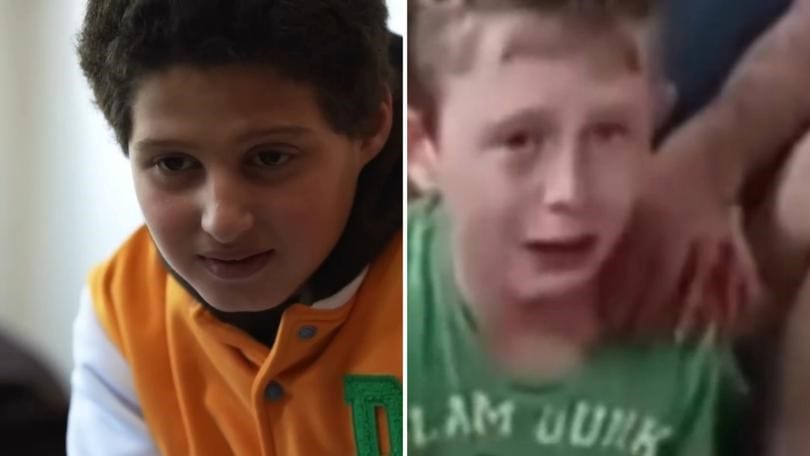
I fear this is not going to be a good newspaper column. A good column leaves readers clear about the writer’s position on an issue. Good columns do not wallow in shades of grey because the journalists who write them do not equivocate.
I have been studiously avoiding writing about the Middle East because what was a black-and-white issue has become ever greyer as the theatre of war grows, and the death toll mounts.
The kidnapping, rape, mutilation and murder of more than one thousand Jews was a black-and-white issue. An act of pure, unfathomable evil.
Israel’s furious pursuit of the perpetrators was also a black-and-white issue. An act essential for self-preservation and one delivered with an understandable tinge of vengeance.
One year, and 40,000 lives later, it is not as easy to paint such a stark picture.
The steady stream of photos of dead Arab children confronts the hardest hearts and challenges any black-and-white view of the war.
We cannot let those images detract from the fundamental issue here.
Dead children or not, Hamas and Hezbollah are evil and Israel’s decision to try to wipe the two organisations from the face of the earth is a mission of good.
Any Australian who protested on the weekend in support of the Palestinian cause should feel uncomfortable at being praised by Hezbollah.
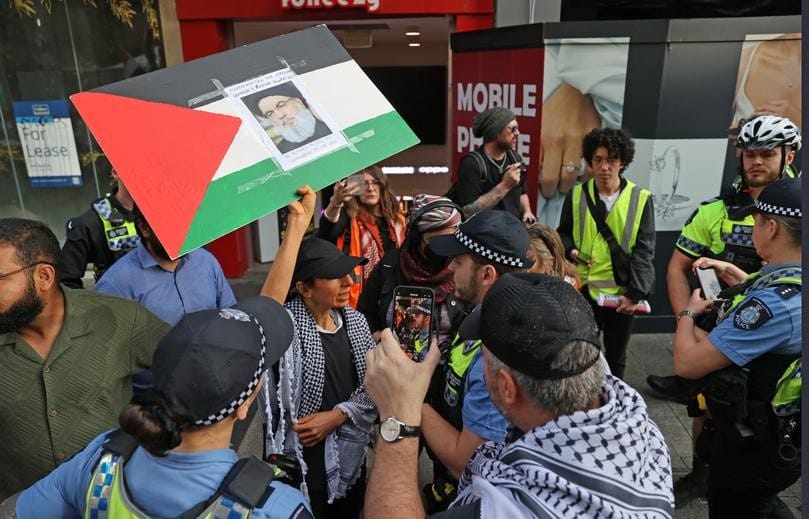
This terror group would happily replace every Western democracy, not just Israel, with a caliphate based on the regime governing Iran.
This is fine unless you are gay, or a woman who might speak her mind (or show her hair), in which case there is an excellent chance you will be shot.
Amnesty has calculated that Iran is responsible for three-quarters of the world’s recorded executions. You cannot look sideways at someone in this place without being hauled before a firing squad.
That should exercise the mind of the woman in Perth who was photographed on Saturday holding a picture of slain Hezbollah chief Hassan Nasrallah.
Lady, if you like him so much go and live in southern Lebanon or Tehran. See how long you last.
Anyone watching footage of dead children who might be moved to support Hamas leader Yahya Sinwar remember that he put those kids in harm’s way.
He guaranteed a high death toll by embedding his militia in a civilian population, using children as human shields.
Sinwar knew that by hosting weapons dumps in the suburbs of Gaza he would be condemning innocent Palestinians to death. He cared so much for them he was willing to let them die in a hail of air strikes.
Sinwar was fine with that because he could use the inevitable Palestinian deaths after October 7 as a bargaining chip.
Those images of wounded kids, brought to us live in Technicolour and Dolby Surround Sound from inside the hospitals of Gaza, were going to be his get-out-of-jail-free card.
His rationale for Israeli restraint.
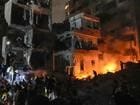
A reason to call ‘barley’vi, as international pressure grew on Tel Aviv to stop the bombs because the response was “disproportionate”.
Sinwar knew that was the way it would play out.
Benjamin Netanyahu knew that also.
This was not their first rodeo.
What Sinwar did not rely on was Netanyahu’s decision to hit pause on Groundhog Day.
Faced with the worst one-day Jewish death toll since the Holocaust, Netanyahu questioned the virtue of restraint.
He decided there was no point in a proportionate response because that had been factored in by Hamas as a cost of business.
Israel clearly believes that only disproportionate actions have a chance of securing the long-needed circuit breaker in the Middle East.
I do not know whether it will be a successful strategy, though, for two reasons.
First, because the Palestinians are not hostages to Hamas; they are not living grudgingly under a dictatorship. They voted for Hamas.
They wanted to be ruled by an organisation dedicated to the destruction of Israel and with a proven history of using voters as human shields.
If this latest flare-up ever settles down, there is a good chance they will still vote for Hamas because they believe the Jews kicked them out of their homes when the state of Israel was created.
And guess what? They have a point there.
The second reason I am unsure about whether Israel’s tactic will work is encapsulated by the two photos above. The picture on the left, is of an 11-year-old Palestinian who watched his parents get killed by Israeli soldiers who also blinded his younger brother with a grenade.
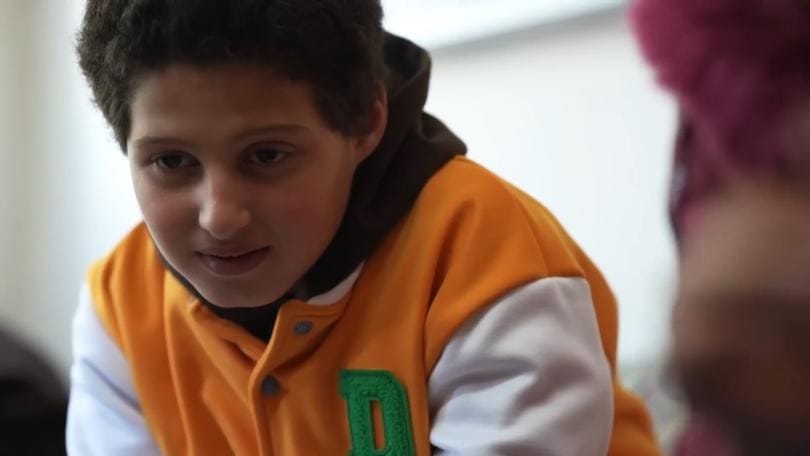
Does anyone reckon that kid is going to study history and arrive at the conclusion that death of his mother in machine gun fire was a necessary circuit breaker?
The only thing that boy is going to study is the operating manual for a shoulder-mounted rocket launcher.
The picture on the below shows a Jewish child. It is a ‘still’ image taken from a video that was live streamed by Hamas terrorists after they shot his older sister. Credit: Supplied
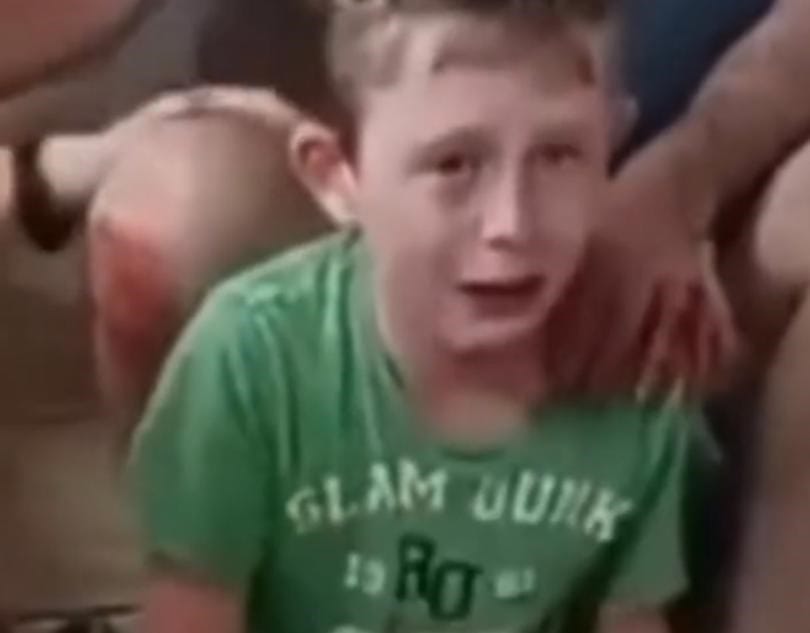
In a few years, that boy will be conscripted into the Israeli army.
At some point next decade, in the West Bank or the Golan Heights, that Jewish boy is going to come up against a pissed-off Arab around his own age who is carrying a rocket launcher and a grudge.
And, thus, groundhog-day will start again.
End of newspaper column titled ‘Two little boys.’
3. THE LYRICS OF THE SONG ‘TWO LITTLE BOYS’ vii
Two little boys had two little toys
Each had a wooden horse
Gaily they played each summer's day
Warriors both of course
One little chap then had a mishap
Broke off his horse's head
Wept for his toy then cried with joy
As his young playmate said.
Did you think I would leave you crying
When there's room on my horse for two
Climb up here Jack and don't be crying
I can go just as fast with two
When we grow up, we'll both be soldiers
And our horses will not be toys
And I wonder if we'll remember
When we were two little boys
Long years had passed, war came so fast
Bravely they marched away
Cannon roared loud, and in the mad crowd
Wounded and dying lay
Up goes a shout, a horse dashes out
from the ranks so blue
Gallops away to where Joe lay
Then came a voice he knew
Did you think I would leave you dying
When there's room on my horse for two
Climb up here Joe, we'll soon be flying
I can go just as fast with two
Did you say Joe I'm all a-tremble
Perhaps it's the battle's noise
But I think it's that I remember
When we were two little boys
Do you think I would leave you dying
There's room on my horse for two
Climb up here Joe, we'll soon by flying
Back to the ranks so blue
Can you feel Joe I'm all a tremble
Perhaps it's the battle's noise
But I think it's that I remember
When we were Two Little Boys.
End of the lyrics of the song, ‘Two Little boys’,
- BRIEF CLOSING COMMENTARY.
Both Ben Harvey’s piece, and the lyrics of the song are well worth the read. The former illustrates a mechanism for the growth of hate in war. While the latter illustrates a mechanism for the manifestation of love in war. These pieces individually and in contrast provide valuable sources on which their readers may reflect. And perhaps even develop successful ideas on how to build a road to permanent future peace in the Middle East.
5. ENDNOTES
[i] Brian Harrisson is a Fellow of CPA Australia and is now retired. After serving National Service in the Royal Australian Navy at eighteen, he enrolled at the Royal Melbourne Technical College (now RMIT University) in Melbourne where he studied accounting and graduated from there in 1960. After graduating, He taught at RMTC on a part time basis for several years and later graduated in Commerce from Melbourne University. He later took post graduate studies in Politics and political sociology and completed the Preliminary work for the Master of Arts.’ Later still, he graduated in Advanced Taxation law from Monash University with a Post graduate Diploma, in law.
Professionally, he has worked in a range of industries, including Chemicals production, Printing, Newspaper Publishing, Glass production, and International and local shipping. He has held the positions of Cost Accountant, Controller, Chief Accountant, and Company Director, throughout his career. He later became a Public Accounting practitioner with his own practice.
He is now retired and is a great grandad whose primary interests are his family, friends, the Accounting Profession, economics, sport, Australia, national and international affairs and the environment. His interest in climate change emerged from work he did on carbon tax policy. His views on the tax and other matters, are reflected on his website Brians Satchel.
[ii] The ‘Nightly’ is an Australian daily digital newspaper, published by Seven West Media,
Based and Western Australia and published on weekdays at 6pm, AEST.
[iii] ’Wikipedia’ the internet encyclopedia, gives an interesting history of the song that is well worthwhile reading, if you are so inclined.
[iv] There is a beautiful rendition of the song by Rolf Harris on the internet. For those who may be interested, I usually access it by: typing into Google, ‘Song ‘Two little boys’, sung by Rolf Harris’. This takes me to ‘You tube’ where it displays a smallish dark pink rectangle with blue profiles of two little boys. Just press the inverted triangle in the pink rectangle, to start listening to the recording by Harris. The wait for the ‘ads’ to end is justified by the pleasure provided by the music and the lyrics.
[v] This author accepts that it is unusual to refer to the lyrics of a song, as literature. Nevertheless, those lyrics tell a story in language, that is inspirational. When partnered with the music and a fine singing storyteller, the song remained inspirational.
[vi] According to the internet accessed through Google, the word ‘barleese’ has been replaced by ‘pause’ or the US version, ‘time out’.
[vi] Source: of Lyrics, composed in the USA by Braden/Maddern/Morse around 1903.Two Little Boys, Rights Management, Song-trust Ave, Sony/ATV Music Publishing LLC, Warner Chappell Music, Inc.
THE END.
